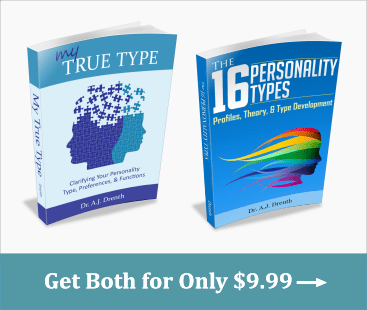
Myers-Briggs theory suggests that every personality type (e.g., INFP) has four primary functions, with each function having its own set of interests and desires. As I’ve discussed elsewhere, the opposing nature of these functions can beget a great deal of strife and dysfunction, both personally and interpersonally. To become more whole, peaceful, and effective, one must learn to reconcile and integrate the entirety of the function stack. The end result is a balancing of the personality, along with a diminishment of ego pride and ego defensiveness.
Well-integrated persons feel largely whole and complete on their own. Seeing the futility in depriving and indulging the inferior function, they realize that there are no short-cuts to wholeness and that other people, including their romantic partners, cannot perform the hard work of integration for them.
In the vast majority of romantic relationships, many of which form prior to personal maturation and integration, partners are selected (often unconsciously) as anticipated shortcuts to wholeness. We see this in the “opposites attract” phenomenon, as Thinkers look to Feelers to supply them with feeling, and so on (see this post for more on this). This is also evident in notions like “she is my other half” or “he is my perfect complement.” Such conceptions imply that it is impossible to experience wholeness outside the context of a relationship.
“You Complete Me!”: The Romantic Fairy Tale
This idea of needing or relying on another person to achieve wholeness is deeply engrained in our culture. Notions such as “my knight in shining armor” convey a need to be saved or rescued by an external savior. While these notions can certainly inspire a great deal of passion and libido (e.g., “living on love”), they fail to capture the nature of mature love.
It is not that we don’t want, or even need, salvation. The quest for salvation, for a better and more satisfying life, is a universal human longing. It is also true, to some degree, that we need to be saved from ourselves, that is, from the destructive forces our own ego. Where the fairy tales seem most off target, however, is suggesting that a romantic partner can accomplish this for us.
While the infatuation stage of a relationship can certainly seem blissful and salvific, once its newness wears off and real life resumes, the need for personal integration inevitably resurfaces. Just as the physical body continues to grow to until it reaches maturity, the psyche seems to have a hard-wired plan for psychological development. And until that maturation process is complete, the psyche will not allow us to experience persistent peace and wholeness.
“I’ll Crutch You if You Crutch Me”
Even if relationships are no guarantee for personal wholeness or salvation, they can still serve as a source of distraction from our deepest fears and insecurities. For some persons, this distraction manages to stunt or appease their need for their personal growth for the rest of their lives. In such instances, the relationship is like a crutch, allowing them to hobble along and somehow ignore the fact they have a broken leg. While the relationship may assuage their inner brokenness, it prevents them from undergoing the surgery required to achieve optimal psychospiritual functioning. Instead of opting for the intense, but temporary pain of surgery, they choose the less intense, but longer lasting pain associated with chronic illness.
Despite the mediocre or problem-riddled nature of such relationships, people are terrified of being without them. There may be a real sense in which they need their partner to survive. Their real fear, of course, is facing their own inner brokenness and incompleteness, as well as the potential pain involved in addressing it.
Mature Love: A New Vista for Integrating Persons
Integrating persons don’t partake in relationships because of a deep sense of personal lack. Feeling mostly whole on their own, a relationship is more like icing on the cake than it is the cake itself. Its purpose is to enhance and enrich the wholeness they already experience as individuals.
Instead of ignoring or distracting themselves from their fears and insecurities, integrating persons honestly appraise, discuss, and work to address them. An intimate relationship with a mature and understanding partner can serve as a wonderful context for doing so. Mature relationships are founded on a platform of complete openness and honesty. They are rooted in reality, regardless of how harsh, messy, or unflattering it appears. Even the rightness of the relationship itself cannot be exempted from questioning or scrutiny in mature relationships.
At first blush, such relationships may seem less safe or less secure. In some cases, this may be true, since integrating persons are less dependent on their partners for their personal wholeness. But in exchange for superficial security comes more truth, more reality, and more intimacy. I see no reason why such a relationship is less likely to endure than one based on fear, fantasy, or childishness.
Childish / Naive Love
- “You complete me.”
- “I can’t live without you. I need to hold on to you.”
- Need-based: “I need you.”
- “I only want to hear positive things about me or our relationship.”
- Founded on infatuation, imagined ideals, and ego needs.
Mature Love
- “You enhance me.”
- “I can live without you. I thereby grant you space and freedom.”
- Want-based: “I want you.”
- “I want you to be honest with me and with yourself, no matter what.”
- Founded on a more honest and realistic appraisal of oneself and one’s partner.
Final Thoughts
It is sad and unfortunate that most adult relationships are more childlike we are willing to admit. Instead of being founded on truth and understanding, such relationships are driven by assumptions, fears, and insecurities. Moreover, the involved parties fail to recognize that much of their suffering—physical pain, malaise, depression, addiction, anger, etc.—may stem from ignoring these underlying psychological issues. As hard as we may try, we cannot fool the psyche. Our fears, insecurities, and neuroses do not magically disappear, but continue to reemerge, in any number of forms, until they are properly reconciled and integrated.
Fortunately, personality typology can help us develop an understanding and awareness of the conscious, as well as unconscious, issues related to our type. It can thereby serve as a powerful tool for forging open, honest, and intimate relationships. By better understanding ourselves and our partners, including the hang-ups associated with our inferior functions, we can better navigate the challenges of personal and relational growth and development.
Learn More in Our Books:
My True Type: Clarifying Your Personality Type, Preferences & Functions
The 16 Personality Types: Profiles, Theory & Type Development
Related Posts:
Personality & Relationships: The Roles We Play (& Why)
